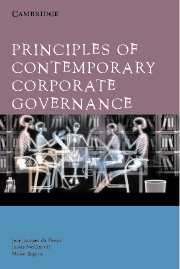Book contents
- Frontmatter
- Contents
- Table of cases
- Table of statutes
- Preface
- PART ONE CORPORATE GOVERNANCE: AN OVERVIEW
- PART TWO CORPORATE GOVERNANCE IN AUSTRALIA
- PART THREE CORPORATE GOVERNANCE IN PRACTICE
- PART FOUR CORPORATE GOVERNANCE: AN INTERNATIONAL PERSPECTIVE
- PART FIVE CORPORATE GOVERNANCE: GOING FORWARD
- 13 The case for enhanced shareholder participation in corporate decision-making
- 14 The ethical obligations of corporations
- 15 Reflections on contemporary corporate governance and its future direction
- Index
13 - The case for enhanced shareholder participation in corporate decision-making
- Frontmatter
- Contents
- Table of cases
- Table of statutes
- Preface
- PART ONE CORPORATE GOVERNANCE: AN OVERVIEW
- PART TWO CORPORATE GOVERNANCE IN AUSTRALIA
- PART THREE CORPORATE GOVERNANCE IN PRACTICE
- PART FOUR CORPORATE GOVERNANCE: AN INTERNATIONAL PERSPECTIVE
- PART FIVE CORPORATE GOVERNANCE: GOING FORWARD
- 13 The case for enhanced shareholder participation in corporate decision-making
- 14 The ethical obligations of corporations
- 15 Reflections on contemporary corporate governance and its future direction
- Index
Summary
Making directors dependent on shareholders could counter some of the factors that incline directors to pursue their own interests or those of executives rather than serve shareholders. It could make the desire to be re-elected a positive force rather than a negative one. It could provide directors with an incentive to develop a reputation for serving shareholders. It could perhaps instill in directors a sense of loyalty towards shareholders …
Lucian Bebchuk and Jesse Fried, Pay Without Performance: The Unfulfilled Promise of Executive Compensation, Cambridge, Mass, Harvard UP (2004) 207.The case for management insulation from shareholder intervention does not follow from informational advantages that management has over shareholders or from the requirements of centralized management. Nor is it justified by fears that shareholders would use their powers too little, too much, or in the wrong ways. Furthermore, reducing management insulation can significantly contribute to addressing major problems of corporate governance that have long troubled financial economists and legal scholars.
Lucian Ayre Bebchuk, ‘The Case for Increasing Shareholder Power’ (2005) 118 Harvard Law Review 833, 913.Introduction
Shareholders, as we have seen in earlier chapters, play a relatively minor role in the governance of companies. The management of the modern corporation is almost solely reserved for the directors of the company. While shareholders maintain certain remedial rights that can be utilised against directors who exercise poor judgement or are otherwise incompetent, these remedies are essentially reactive, as opposed to providing shareholders with a meaningful opportunity to participate in the strategic planning and decision-making of the company.
- Type
- Chapter
- Information
- Principles of Contemporary Corporate Governance , pp. 320 - 342Publisher: Cambridge University PressPrint publication year: 2005



